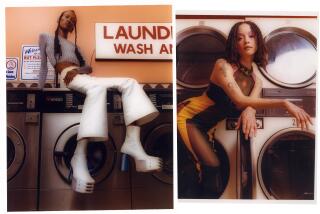Living in the lap of necessity
- Share via
My 20s were so lacking in creature comforts, I could have been in a Dickens novel. What a bedraggled waif I was, living in a grimy New York City apartment with no dishwasher, no air conditioner and no on-site laundry facilities. Like most Manhattanites, I didn’t have a car, nor did I have a television set, though that was mostly because I was incredibly pretentious and wanted to convey the (false) notion that I was the kind of person who spent all evening -- often, alas, at the laundromat -- reading Ibsen plays.
Those days are over, thank God. Now that I’ve traded the pseudo-intellectual, quasi-ascetic affectations of my protracted adolescence for the unapologetic consumerism of early middle age -- in other words, now that I no longer live in New York -- I enjoy an array of household conveniences. Instead of dragging my laundry along block after block of filthy sidewalks, I can take my clothes directly off my body and deposit them into my very own washing machine (and then, in a magnificent coda, my very own dryer). I also have a dishwasher, a cellphone, wireless Internet and satellite cable service that’s so advanced that accidentally sitting on the remote can cause entire air traffic control systems to reset. Tragically, I still don’t have air conditioning, which is why I’m in a bad mood six months of the year, but I do have a car, which I often use to get to places to which I could easily walk.
Does that make me spoiled? As an American, I’m pretty much spoiled by default (even in my wretched, substandard days in New York, I still ate brie; I just had to wash the plate by hand). A new survey by the Pew Research Center suggests the real difference between a luxury and a necessity has dawned on Americans -- and, as a result, we may be getting less spoiled.
In a telephone survey of 1,003 people conducted in early April, only 21% said a dishwasher was a necessity, and 66% said a clothes dryer was a necessity. When the same questions were asked in 2006, 35% considered dishwashers indispensable and 83% thought the same of dryers. Other items that now seem less than absolutely necessary include microwave ovens (down 21 points from 2006), home air conditioning (down 16 points) and cable or satellite TV (down 10 points).
Pew researchers made a point of saying that some of the findings were because of new technology supplanting old, particularly among younger people. In other words, while older people tend to view things like land lines and television sets as necessities, younger people favor cellphones and computers. Televisions (as in TV sets) were deemed necessary by only 52% of those surveyed. Not only is that a 12-point drop from 2006, it’s the smallest vote for TV-set necessity since Pew first posed the question in 1973, undoubtedly because more people now watch TV on computers and other digital gadgets.
Even so, the ratings drop looks promising for Ibsen -- OK, maybe Dan Brown -- and can-do-without Americans. But if you think a brave new frugality must be sweeping the nation -- and flying its flag in the form of a thousand undershirts hanging from backyard clotheslines -- think again. The question the survey-takers posed about each of these items was not, “Are you willing to live without a dishwasher/clothes dryer/cellphone?” It was, “Do you pretty much think of this as a necessity or pretty much think of this as a luxury you could do without?”
Uh, no to the first; yes to the second?
Part of what’s so perverse -- yet perversely endearing -- about American consumerism is the way we don’t allow luxury to preclude necessity. Just because we don’t technically need something doesn’t mean we can’t convince ourselves that we’ll die without it. There’s a reason the statistic about more American households having TVs than indoor plumbing has been floating around for decades (although more recent Census data show indoor toilets gaining a slight edge over TVs, perhaps because people realized they could put a TV in the bathroom). It’s because we define luxuries as being in the eye of the beholder (if watching “Wheel of Fortune” has more value than a flush toilet, hey, no judgments) and we hold as self-evident that some of them fall into a category all their own: necessary luxuries.
That may be an oxymoron, not to mention evidence that we may be a nation of morons. But acquiring things we don’t need and then coming to rely on them as though they were as essential as air and water isn’t just about affluence, it’s about our national identity. For better or worse, it’s something that makes us who we are.
Reading Ibsen in the laundromat? That’s downright un-American. So the next time you hear folks agreeing that they could do without their clothes dryers, don’t believe it. They’re either lying or they’re incredibly pretentious. Or they’re in a Dickens novel and should get out of New York. Drive, don’t walk.



